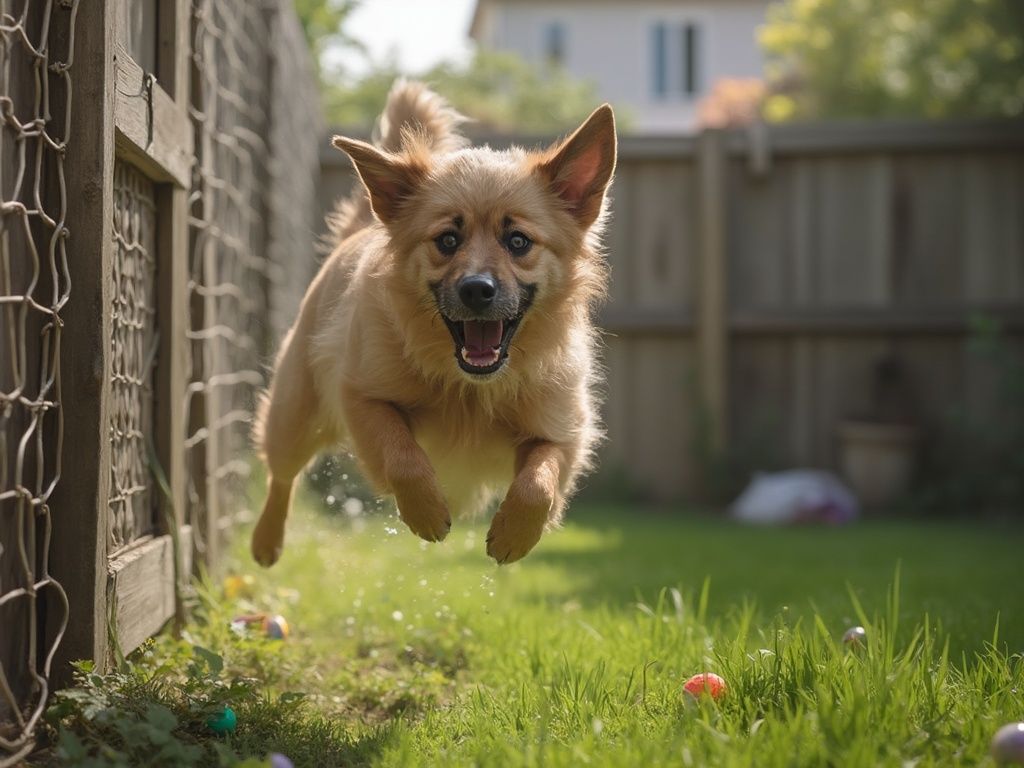He’s there, then the next second… He’s gone! Runaway dogs are a major concern for many owners. A dog that escapes not only endangers its own safety but also that of others, especially in case of an accident. And for the owners, it’s an immense source of stress! Between the searches and the doubts when the escape lasts a bit too long, it can drive you crazy.
It is therefore important to understand the reasons for this behavior and to find effective solutions to remedy it. For your sake and that of your pooch, we strongly advise you to read this article! As a bonus, you will discover the most runaway-prone dog breeds.
Runaway Dog: What’s Going on in Their Head? #
Many factors can lead a dog to run away, and no breed is immune to it. But when you look closely, some factors regularly recur.
Reproductive Instinct #
The natural reproductive instinct is one of the main causes of running away, especially in unneutered dogs. A male dog can travel several miles to reach a female in heat. This hormonal drive is difficult to control if no preventive measures are in place.
Lack of Stimulation #
A dog that is bored or does not receive enough physical and mental exercise will seek ways to entertain itself. Exploring outside the home then becomes an attractive activity to fill this void.
Separation Anxiety #
Some dogs suffer from anxiety when left alone, which can push them to run away in an attempt to find their owner. This behavior is common in breeds very attached to their human family.
Hunting Instinct #
Dogs with a strong predatory instinct, like Beagles or Huskies, may be tempted to follow prey. A simple scent or movement is enough to entice them to go on a trail. This means that hunting dogs for example are rather predisposed to running away.
Fear or Panic #
Some dogs may run away when frightened by a sudden noise, such as fireworks, thunderstorms, or horns. These unexpected events can trigger a panic reaction that drives the animal to quickly move away to safety, sometimes unable to find its way back. This can especially happen during celebrations, like July 14th or New Year’s Eve.

Poorly Defined Territory #
If a dog does not clearly perceive the boundaries of its territory, it may consider the surrounding areas as an extension of it. This leads it to explore further.
➤ According to Dogster, in the US, more than 10,000,000 dog & cat disappearances are recorded each year. Among the most frequently reported breeds are the Labrador Retriever, Beagle, and Siberian Husky. These figures highlight the importance of adopting preventive measures.
How to Prevent Dogs from Running Away? #
Preventing running away often requires a combination of physical, behavioral, and educational measures.
Neutering #
Although not mandatory, especially if you want your dog to have puppies, neutering your dog is one of the most effective solutions to reduce hormonal drives related to reproduction. This intervention can prevent escapades motivated by the search for a partner.
Environmental Enrichment #
A well-stimulated dog is less likely to run away. Offer them:
- Interactive toys to stimulate their mind.
- Regular physical activities, such as walks or ball games.
- Agility exercises to channel their energy.
Secure Fencing #
Ensure your garden is properly fenced. A fence at least 6 feet high can deter most dogs from jumping. Also, consider burying part of the fence to prevent dogs from digging.
Supervision and Recall #
Do not leave your dog unsupervised in unsecured areas. Teach them recall so they return quickly when you call them. For this, a good positive training method is essential!
Invoxia’s Minitailz: Technology for Runaway Dogs #
Sometimes, taking precautions is not enough. And when the dog has run away, it is sometimes difficult, if not impossible, to find them. The only solution to prevent this eventuality is to equip your dog with a precise and reliable GPS tracker.
Invoxia has well understood this issue among many owners. That’s why the Minitailz, beyond its advanced health and activity tracking, also includes a GPS tracker specially designed for dogs. And its features are essential for owners of runaway dogs:
- Use of the 4G LTE-M network for international coverage and high GPS tracking accuracy.
- Creation of virtual fences with anti-runaway alerts in case of entry or exit from the area.
- Live Tracking in case of escape, to track their positions in near real-time and find them as quickly as possible.

Top 10 Most Runaway-Prone Dog Breeds #
Some dog breeds are more prone to running away than others, often due to their natural instinct or energy.
1. Siberian Husky #
Known for its independent spirit, the Husky is a very energetic breed. It needs a lot of space and exercise. If it doesn’t find stimulation, it will go on an adventure.
2. Beagle #
Its exceptional sense of smell and hunting instinct drive it to follow trails over long distances. Even a fenced yard may be insufficient to hold a motivated Beagle.
3. Jack Russell Terrier #
Small but full of energy, Jack Russells are always on the lookout for new explorations. Their natural curiosity often leads them to run away.
4. Labrador Retriever #
Although docile, the Labrador loves to explore. Its love of water and hunting instinct can drive it to wander off.
5. Border Collie #
Intelligent and hyperactive, the Border Collie needs a lot of stimulation. A lack of activity can lead it to seek ways to entertain itself elsewhere.
6. German Shepherd #
Protective and territorial, the German Shepherd may run away to monitor or explore its environment. Good training is essential to channel its energy.
7. Boxer #
Playful and full of energy, the Boxer may seek to escape to expend more energy. This breed needs long walks and daily exercise.

8. Dalmatian #
Curious and active, the Dalmatian loves to explore. Without proper stimulation, it can easily run away.
9. Irish Setter #
A quintessential hunting dog, the Irish Setter follows its instinct and can wander off over long distances to track prey.
10. Coonhound #
Used for hunting, the Coonhound has an impressive sense of smell and endurance. It is very likely to wander off to follow a trail.
What to Do if Your Dog Regularly Runs Away? #
If your dog often runs away, it is important to react quickly:
- Identify the cause: Observe its behavior to understand what drives it to escape.
- Reinforce the fences: Ensure it cannot dig or jump over the barriers.
- Consult a professional: A dog trainer can help you implement solutions tailored to your dog.
- Use a GPS tracker for dogs: In case of escape, a GPS tracker can allow you to quickly locate your pet and bring it back safely.
Running away is a common but manageable behavior in dogs. It often stems from a natural instinct or lack of stimulation. By understanding the specific causes for your pet and implementing appropriate measures, you can significantly reduce the risk of running away!

